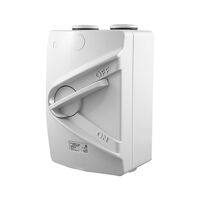Kingsgrove Branch:
3 Phase Isolator

G'day! When you step up from standard household power to the heavy-duty world of commercial and industrial machinery, the rules of the game change. We are talking about 415-volt, three-phase power. It runs the big air conditioning units on office blocks, the motors in factories, and the heavy machinery in workshops across the country.
With that much power comes a massive need for safety. You cannot simply unplug a hardwired industrial lathe or a massive HVAC unit. To ensure these beasts can be serviced safely without putting lives at risk, you need a dedicated disconnection point. This is the job of the 3 phase isolator.
What is a 3 Phase Isolator?
A 3 phase isolator is a robust, manually operated switch designed to handle multi-phase electricity. Unlike a standard light switch that breaks a single active wire, this device cuts all three active phases (and often the neutral) simultaneously.
It acts as a local "off" switch located right next to the equipment it serves. It is not designed to trip automatically like a circuit breaker; its sole purpose is to allow a technician to physically isolate the machine from the power grid. This ensures that there is zero electrical energy flowing to the motor or compressor while maintenance is being carried out.
Why Are They Mandatory?
In Australia, safety regulations are incredibly strict regarding high-voltage machinery. The Australian Wiring Rules (AS/NZS 3000) dictate that fixed appliances must have a means of isolation that is readily accessible.
The key feature of a quality 3 phase isolator is its ability to be locked. When a technician arrives to service a rooftop air conditioner, they turn the massive rotary handle to "OFF" and attach a personal padlock to the switch. This is known as "Lockout/Tagout." It guarantees that nobody inside the building can accidentally turn the power back on while the technician has their hands inside the machine. It is a simple mechanism that saves lives every day.
Built Tough for Aussie Conditions
Because these switches are often mounted on rooftops, exterior walls, or in dusty workshops, they need to be built like a tank. You cannot use flimsy plastic outdoors in our climate.
When a professional sources gear from a reputable electrical wholesaler, they look for isolators with a high IP rating—usually IP66. This means the unit is completely dust-tight and protected against powerful jets of water. They are also made from UV-stabilised materials to prevent the casing from becoming brittle and cracking under the relentless Australian sun.
Installation: Strictly for the Pros
This is the most critical warning we can give. Three-phase power is 415 volts. It is significantly more dangerous than standard domestic power and allows for very little margin for error.
Installing or replacing a 3 phase isolator is absolutely not a DIY task. It is illegal and potentially fatal for anyone other than a licensed electrician to perform this work. A qualified professional ensures that the phase rotation is correct (so your motor doesn't run backwards), the connections are torqued properly to prevent fires, and the water seals are intact.
Heavy-Duty Gear from Schnap Electric
When you are dealing with high-voltage industrial equipment, you need components that you can trust implicitly. A failed switch can lead to costly downtime or dangerous safety breaches.
Schnap Electric Products is a leading supplier for the trade industry in Australia. They stock a comprehensive range of industrial switchgear, including robust 3 phase isolator units rated for various amperages to suit everything from small pumps to massive industrial plants. By providing the same high-standard, compliant equipment you would find at any major electrical wholesaler, Schnap Electric ensures your workplace remains safe, compliant, and operational. For heavy-duty safety you can rely on, trust the industrial range from Schnap Electric.
Recent posts

Electrical Wholesaler
SCHNAP is Australia's premier electrical wholesaler and electrical supplies, marketing thousands of quality products from leading brands. Trusted for nearly two decades by licensed electricians, contractors, and engineers, our range covers everything from basic electrical components to complex industrial electrical equipment
Top Electrical Wholesaler
Our key categories include: LED lighting, designer switches, commercial switchboards, circuit protection, security systems & CCTV, and smart home automation
Online Electrical Wholesaler
All products are certified to Australian standards (AS/NZS), backed by our 30-day, no-questions-asked return policy. Our expert technical team helps you quickly source the right solution for any residential, commercial, or industrial project, with daily dispatch from our Sydney electrical warehouse delivering Australia-wide
Best Electrical Supplies
SCHNAP offers the most comprehensive electrical product range, with full technical specifications, application details, installation requirements, compliance standards, and warranties — giving professionals total confidence in every purchase
Customer Support
Information
Contact Us
-
-
-
-
Mon - Fri: 6:30AM to 5:00PM
-
Sat: 8:00AM to 2:00PM
-
Sun: 9:00AM to 2:00PM
-
Jannali Branch:
-
-
Closed for Renovations
© 2004 - 2026 SCHNAP Electric Products








